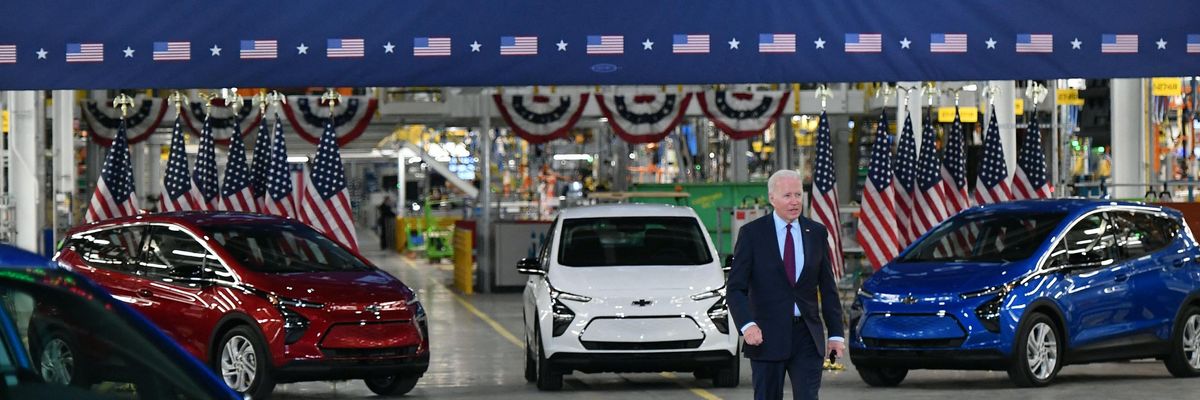Climate and environmental campaigners on Thursday cheered the Biden administration's new $5 billion plan to build a national electric vehicle charging network with funding from an infrastructure law the president signed last year.
"With this money flowing to states, we can start to build for the electric vehicle revolution we know is coming."
Funding for the new network will come from the National Electric Vehicle Infrastructure (NEVI) Formula Program created under the Infrastructure Investment and Jobs Act, which President Joe Biden signed last November.
Morgan Folger, director of the Destination: Zero Carbon program at the advocacy group Environment America, said in a statement that "with this money flowing to states, we can start to build for the electric vehicle revolution we know is coming."
Will Anderson, deputy legislative director at the Sierra Club, said the group was "pleased to see these critical funds going out the door to states to build electric vehicle chargers, an important investment to support our nation's transition to electric vehicles and prioritize domestic manufacturing."
"In addition to fully funding the Biden administration's goal of 500,000 chargers across the nation, the passage of legislation investing in climate, jobs, and justice will ensure that communities have access to a range of critical clean transportation priorities," he added, "including consumer incentives that support unionized workforces and credits for used EVs, electric school buses, and more accessible and frequent public transit service."
Mac Dressman, transportation associate at the U.S. Public Interest Research Group, said that "this step toward an all-electric, zero-emission future is essential to ensure cleaner air for all."
According to the Department of Transportation's Federal Highway Administration, the new program "will provide nearly $5 billion over five years to help states create a network of EV charging stations along designated Alternative Fuel Corridors, particularly along the Interstate Highway System."
The agency added:
The total amount available to states in fiscal year 2022 under the NEVI Formula Program is $615 million. States must submit an EV Infrastructure Deployment Plan before they can access these funds. A second, competitive grant program designed to further increase EV charging access in locations throughout the country, including in rural and underserved communities, will be announced later this year.
"A century ago, America ushered in the modern automotive era; now America must lead the electric vehicle revolution," said U.S. Transportation Secretary Pete Buttigieg. "The president's bipartisan infrastructure law will help us win the EV race by working with states, labor, and the private sector to deploy a historic nationwide charging network that will make EV charging accessible for more Americans."
"The key to unlocking a more climate-friendly future featuring electric cars on every block is to make owning an EV more convenient and affordable."
U.S. Energy Secretary Jennifer Granholm added that "we are modernizing America's national highway system for drivers in cities large and small, towns, and rural communities, to take advantage of the benefits of driving electric. The bipartisan infrastructure law is helping states to make electric vehicle charging more accessible by building the necessary infrastructure for drivers across America to save money and go the distance, from coast-to-coast."
The administration's announcement came two days after Biden said that Tritium, an Australian company that makes EV chargers, will build a manufacturing facility in Tennessee that will employ 500 workers and produce 30,000 chargers annually.
While the Biden administration is under pressure to more broadly overhaul the U.S. transportation system--which, as a recent analysis showed, leaves the poor and people of color behind while exacerbating inequality and the climate emergency--campaigners still celebrated Thursday's announcement as progress.
Related Content
New Report Shows How US Transportation System 'Fuels Inequality'
Brett Wilkins
Environment America's Folger said that "a more prolific charging network makes it easier for people to choose to drive an electric car and feel confident they have a place to power up along the way."
"The key to unlocking a more climate-friendly future featuring electric cars on every block is to make owning an EV more convenient and affordable," she added. "Restoring the electric vehicle tax credit is the next step Congress should take to ensure these cars are affordable."
Noting that "tragically, pollution from cars, trucks, and other vehicles cuts short an estimated 58,000 lives every year," Dressman asserted that "building a national network of EV charging stations is just what the U.S. needs to make the transition to electric vehicles."
"It gives Americans the right infrastructure to reduce air pollution and tackle the climate crisis by making it easier to switch to zero-emission vehicles," he added.





